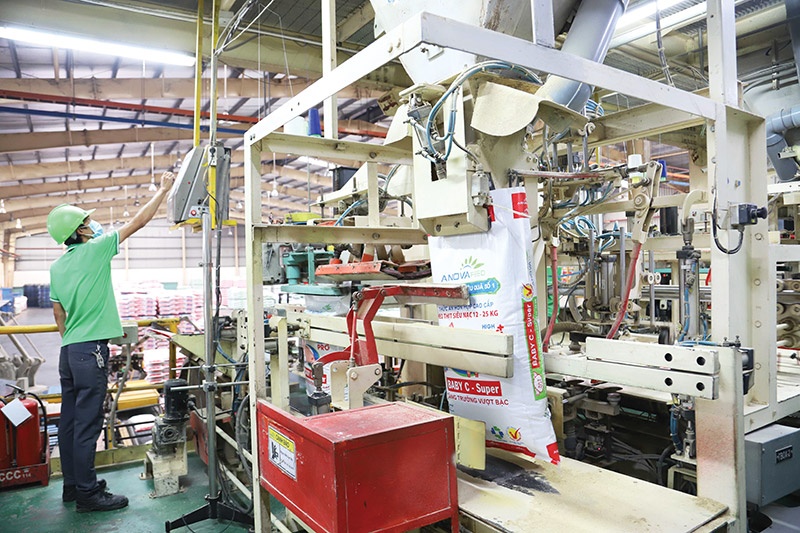Farmers squeezed out by feed giants
 |
| Costs are increasing for farmers, meaning it is harder to breed and avoid heavy losses, Le Toan |
Foreign-backed husbandry groups and animal feed producers are gradually grabbing a larger proportion of market share, with farmers being forced out of the cycle at a rate never seen before in Vietnam.
In provinces known for husbandry, such as Dong Nai and Binh Phuoc in the south, Hoa Binh and Phu Tho in the north, seven or eight out of every 10 farms are shifting to become partners or suppliers of bigger companies, rather than thrashing it out on their own.
Nguyen Hoang Hai, a husbandry engineer for Masan Group’s Meat Deli, said that the market share ratio of husbandry companies to farmers in providing white-feather chickens has risen to 90-10 in percentage terms, while only a couple of years ago the radio sat at around 60-40. “We can see the change of production, with the capacity of husbandry rising 2.5-fold and market share moving from 9 per cent to over 55 per cent within only two years,” Hai said.
Pig breeding is deemed more complicated than chicken, so the shift is occurring more slowly. In the view of Nguyen Kim Doan, vice chairman of the Dong Nai Livestock Association, around 20-30 per cent of farmers have become partners of husbandry companies in the last two years alone.
“A lot of farmers have given up on breeding and cut down numbers to avoid heavy losses – in the context that the price of animal feed is still climbing up, the African swine fever epidemic cannot be controlled completely, and selling prices have not generated any profit for farmers,” said Doan.
In Vietnam, most animal feed and breed supply for farmers depend more on big companies, while the selling prices of live hogs and chickens on the market are now tending to favour larger companies like C.P., Japfa Comfeed, Dabaco, Mavin, De Heus, and CJ Vina Agri.
Husbandry companies initially did not see the significant movement of contract-based suppliers, who shifted from their own production to partners of both large local and foreign-invested companies.
However, Do Hoang Long, Japfa’s development and sales manager, said, “The number of abandoned farms is increasing month by month. Most of them are small in size and cannot meet the standards of epidemic prevention. Meanwhile, large-scale husbandry optimises costs, reports high performance and good quality, and stabilises selling prices.”
Meanwhile, a representative of De Heus said, “Due to the increase in imported material prices, the rising prices of feed has led to a decline in the number of pigs across the country and lowered selling output.”
Animal feed prices made by the bigger companies have been adjusted around a dozen times over the last two years. This has been explained by the increase in imported materials like wheat, soybean, corn kernels, and cornmeal – and those prices have already soared and even doubled compared to two years ago.
“Every time the price of animal feed is adjusted, I lose an additional VND10 million ($435) every day,” said Nguyen Cong Bac, owner of a large-scale farm in the northern mountainous province of Son La. “Unfortunately, the selling prices of live pork are reducing, while the costs are increasing – so for every pig sold, I suffer a loss of about VND600,000 ($26).”
Meanwhile, selling prices of live hogs on the market tend to follow the listing number of leading players every day, mainly in the form of foreign-invested groups like C.P., Japfa, and CJ.
“Big companies are dominating the supply of pigs on the market, so all of us, including small-sized farms and companies, are following their rules,” said Bac.
At present, C.P. Vietnam is the biggest player with 19 per cent of market share in animal feed production, followed by Cargill, Japfa, De Heus, CJ Vina Agri, Dabaco, and New Hope.
What the stars mean:
★ Poor ★ ★ Promising ★★★ Good ★★★★ Very good ★★★★★ Exceptional
Related Contents
Latest News
More News
- PM outlines new tasks for healthcare sector (February 25, 2026 | 16:00)
- Ho Chi Minh City launches plan for innovation and digital transformation (February 25, 2026 | 09:00)
- Vietnam sets ambitious dairy growth targets (February 24, 2026 | 18:00)
- Masan Consumer names new deputy CEO to drive foods and beverages growth (February 23, 2026 | 20:52)
- Myriad risks ahead, but ones Vietnam can confront (February 20, 2026 | 15:02)
- Vietnam making the leap into AI and semiconductors (February 20, 2026 | 09:37)
- Funding must be activated for semiconductor success (February 20, 2026 | 09:20)
- Resilience as new benchmark for smarter infrastructure (February 19, 2026 | 20:35)
- A golden time to shine within ASEAN (February 19, 2026 | 20:22)
- Vietnam’s pivotal year for advancing sustainability (February 19, 2026 | 08:44)

 Tag:
Tag:




















 Mobile Version
Mobile Version